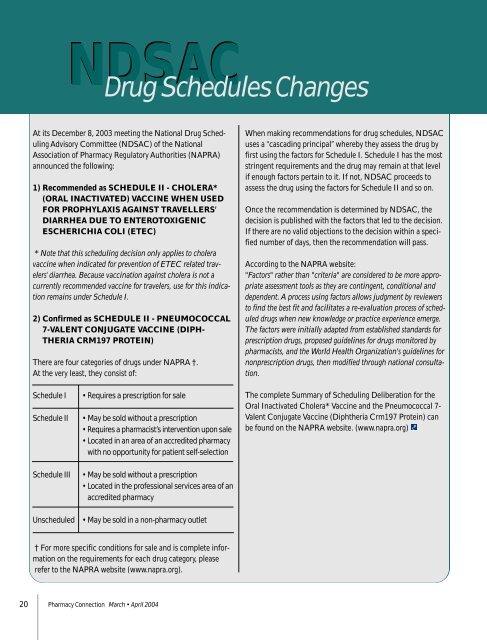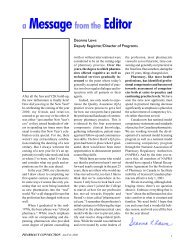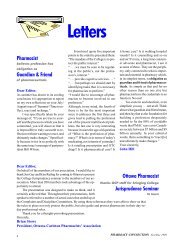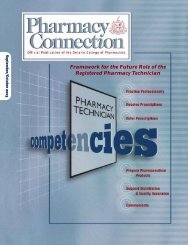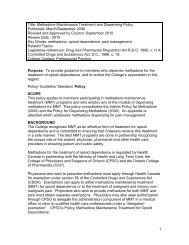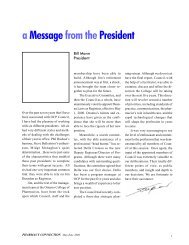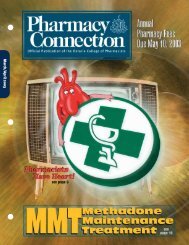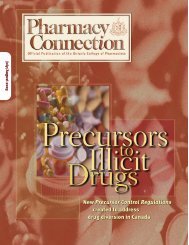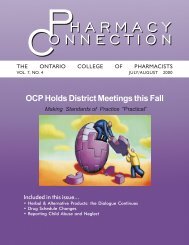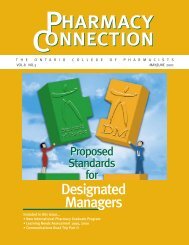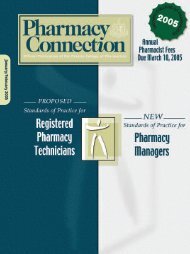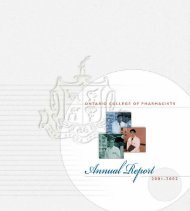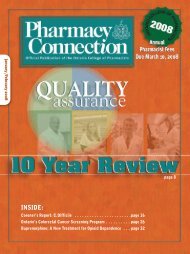Pdf File - Ontario College of Pharmacists
Pdf File - Ontario College of Pharmacists
Pdf File - Ontario College of Pharmacists
You also want an ePaper? Increase the reach of your titles
YUMPU automatically turns print PDFs into web optimized ePapers that Google loves.
NDSAC<br />
Drug Schedules Changes<br />
At its December 8, 2003 meeting the National Drug Scheduling<br />
Advisory Committee (NDSAC) <strong>of</strong> the National<br />
Association <strong>of</strong> Pharmacy Regulatory Authorities (NAPRA)<br />
announced the following:<br />
1) Recommended as SCHEDULE II - CHOLERA*<br />
(ORAL INACTIVATED) VACCINE WHEN USED<br />
FOR PROPHYLAXIS AGAINST TRAVELLERS’<br />
DIARRHEA DUE TO ENTEROTOXIGENIC<br />
ESCHERICHIA COLI (ETEC)<br />
* Note that this scheduling decision only applies to cholera<br />
vaccine when indicated for prevention <strong>of</strong> ETEC related travelers’<br />
diarrhea. Because vaccination against cholera is not a<br />
currently recommended vaccine for travelers, use for this indication<br />
remains under Schedule I.<br />
2) Confirmed as SCHEDULE II - PNEUMOCOCCAL<br />
7-VALENT CONJUGATE VACCINE (DIPH-<br />
THERIA CRM197 PROTEIN)<br />
There are four categories <strong>of</strong> drugs under NAPRA †.<br />
At the very least, they consist <strong>of</strong>:<br />
When making recommendations for drug schedules, NDSAC<br />
uses a “cascading principal” whereby they assess the drug by<br />
first using the factors for Schedule I. Schedule I has the most<br />
stringent requirements and the drug may remain at that level<br />
if enough factors pertain to it. If not, NDSAC proceeds to<br />
assess the drug using the factors for Schedule II and so on.<br />
Once the recommendation is determined by NDSAC, the<br />
decision is published with the factors that led to the decision.<br />
If there are no valid objections to the decision within a specified<br />
number <strong>of</strong> days, then the recommendation will pass.<br />
According to the NAPRA website:<br />
"Factors" rather than "criteria" are considered to be more appropriate<br />
assessment tools as they are contingent, conditional and<br />
dependent. A process using factors allows judgment by reviewers<br />
to find the best fit and facilitates a re-evaluation process <strong>of</strong> scheduled<br />
drugs when new knowledge or practice experience emerge.<br />
The factors were initially adapted from established standards for<br />
prescription drugs, proposed guidelines for drugs monitored by<br />
pharmacists, and the World Health Organization's guidelines for<br />
nonprescription drugs, then modified through national consultation.<br />
Schedule I<br />
Schedule II<br />
• Requires a prescription for sale<br />
• May be sold without a prescription<br />
• Requires a pharmacist’s intervention upon sale<br />
• Located in an area <strong>of</strong> an accredited pharmacy<br />
with no opportunity for patient self-selection<br />
The complete Summary <strong>of</strong> Scheduling Deliberation for the<br />
Oral Inactivated Cholera* Vaccine and the Pneumococcal 7-<br />
Valent Conjugate Vaccine (Diphtheria Crm197 Protein) can<br />
be found on the NAPRA website. (www.napra.org)<br />
Schedule III<br />
• May be sold without a prescription<br />
• Located in the pr<strong>of</strong>essional services area <strong>of</strong> an<br />
accredited pharmacy<br />
Unscheduled<br />
• May be sold in a non-pharmacy outlet<br />
† For more specific conditions for sale and is complete information<br />
on the requirements for each drug category, please<br />
refer to the NAPRA website (www.napra.org).<br />
20<br />
Pharmacy Connection March • April 2004


